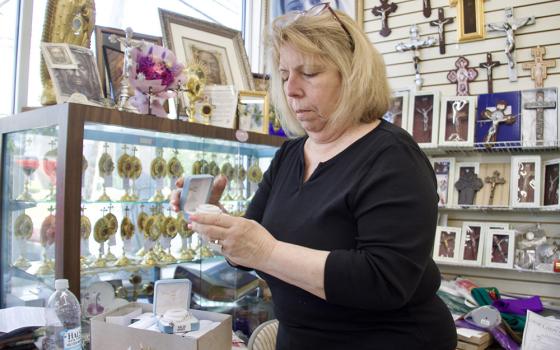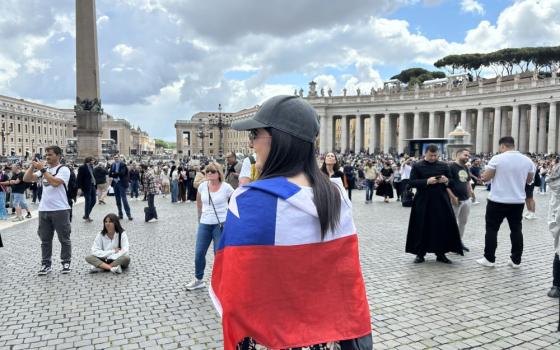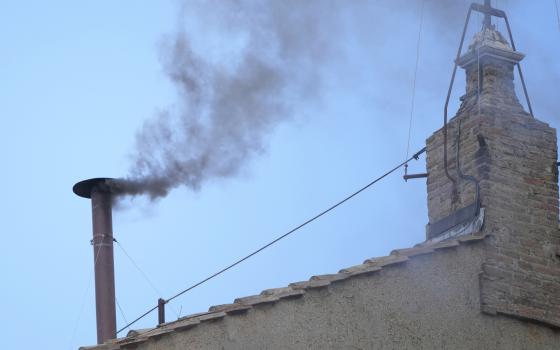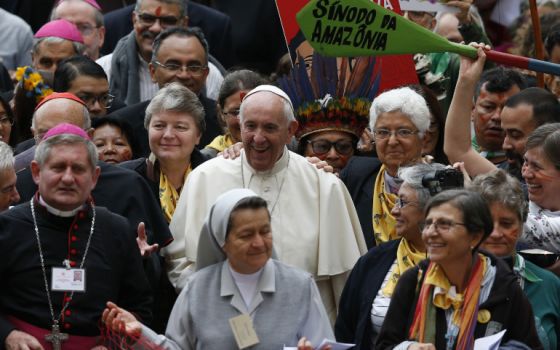With Michelangelo's frescoes as a backdrop, workers on scaffolding May 2 prepare to attach the stove pipe to the stove that will be used to burn ballots during the conclave to elect a new pope in the Sistine Chapel at the Vatican. Cardinals under age 80 will enter the conclave May 7. (CNS/Vatican Media)
Two Jesuits have rallied in recent days to advocate for continuing Pope Francis' legacy, strongly promoting the late Jesuit pontiff's vision of a more welcoming and inclusive Catholic Church.
The comments of two Jesuit cardinals, Vatican-based Michael Czerny of Canada and Stephen Chow of Hong Kong, both in on-the-record interviews, are part of an increasingly public debate among cardinals about the church’s future ahead of next week's conclave to elect a new pope.
Their campaign for the welcoming church of Pope Francis comes as a few cardinals have used the pre-conclave meetings to bash Francis' efforts to invite laity — Catholic faithful who are not ordained clergy — to have a greater role in church leadership.
Czerny, 78, mounted his defense of Francis' vision of a more synodal church in a May 2 interview with journalist Norah O'Donnell on CBS News. "If you don't welcome, there's no further possibility," Czerny said.
'It isn't just a church matter. We need to learn to welcome, we need to learn to listen if we're going to survive as a church family.'
—Cardinal Michael Czerny
"Welcoming and listening are two ways of saying the same thing," said Czerny, who was a close collaborator of Francis, a fellow member of the Society of Jesus order, and the prefect of the Vatican's Dicastery for Promoting Integral Human Development.
"It isn't just a church matter," the Canadian cardinal said. "We need to learn to welcome, we need to learn to listen if we're going to survive as a church family."
As cardinals continue to meet for closed door meetings ahead of the conclave, Czerny made the case for not turning back on the Francis legacy.
"The choice is not between continuity or change," Czerny said. "The choice is to go forward, and that includes both continuity and change and that has always been our way forward. We never make a total break and we never stay in the past. It's both. It has to be both, that's the life of the church."
Joining Czerny’s advocacy, Cardinal Chow, 65, also voiced strong support for synodality, the effort to reform the church's structures to be more participatory and with less emphasis on power and influence centered in the clergy.
"Synodality is the future for the church in Asia, and elsewhere," Chow told America magazine, adding that he is "confident in saying this."
There are varying degrees of support for different aspects and levels of the more inclusive approach to the church known as synodality, the cardinal said. Among the members of the College of Cardinals who participated in the synod on synodality, there is strong support for the Francis vision of a more welcoming direction for the church.
A few cardinal electors, who requested anonymity, told the National Catholic Reporter they observed a salient irony: Synodality may be the future but pre-conclave meetings are not very synodal.
That is, these cardinals said, there is a stark contrast between the synod on synodality's roundtable-style conversations about the future of the church and the discussions taking place inside the Vatican now. In the general congregations, as the near-daily meetings are known, cardinals offer one speech after another. Many cardinals ignore the time-limit guidance: the speakers are asked to keep their interventions, as they are known, to no more than five minutes.
Cardinal Baltazar Porras Cardozo of Merida, Venezuela, arrives to attend a general congregation meeting of the College of Cardinals in the New Synod Hall at the Vatican April 29. The conclave to elect a new pope begins May 7. (CNS/Pablo Esparza)
"Synodality will continue to move on and we will continue to discern. It's not something that is fixed," Chow said in his America interview, conducted on April 28 in the Jesuit Curia in Rome. "Synodality is still a developing thing. We need to continue to discern how the church will move forward as a synodal church."
Critics fear that synodality means the democratization of the church, Chow said, and it most certainly is not. "There are people who are still worrying about that, too," he said.
"They still don't understand, they think that we're getting rid of the hierarchy," the Hong Kong cardinal said. "That's not the case. But they will not be convinced until they experience it themselves."
In an interview with the Argentine daily La Nacion, Morocco's Cardinal Cristóbal López Romero said much more work needs to be done to bring the church — and its cardinals — on board with synodality.
The concept is not always easy to grasp, even for cardinals, the cardinal said. Synodality, López Romero said, "doesn't divide, but there are different positions, and we'll have to work so everyone understands what synodality means."
López Romero said a bishop attending the synod on synodality said he was "horrified when we talked about seeking consensus, because he understood consensus to mean half plus one."
Advertisement
The Moroccan cardinal explained that wasn't what consensus meant. Instead, he told the bishop, "we all talk and try to reach an agreement. And if in the end, an agreement isn't reached, then the pope or whoever else will say what, or we'll pause the discussions for a while while we pray to try to reach an agreement."
"And if some want to go to the theater and others want to go to the cinema, and the day arrives, the pope can decide that we should go to the cinema, and those who wanted to go to the theater don't boycott and go to the cinema with joy."
Meanwhile, today's much-discussed pre-conclave news item comes not from Rome, but from Washington, D.C.
One week ago today President Donald Trump was here at the Vatican for the funeral of Pope Francis.
Today — in the middle of the church's official nine days of mourning for the late pope — the White House's official Twitter account posted an AI-generated image of the president dressed as pope.
A member of the European Parliament immediately clapped back on social media: "How sad it is to see a country that was once great, reliable and serious, being led by a man who continually makes it look ridiculous."
Camillo Barone contributed to this report.
The National Catholic Reporter's Rome Bureau is made possible in part by the generosity of Joan and Bob McGrath.







